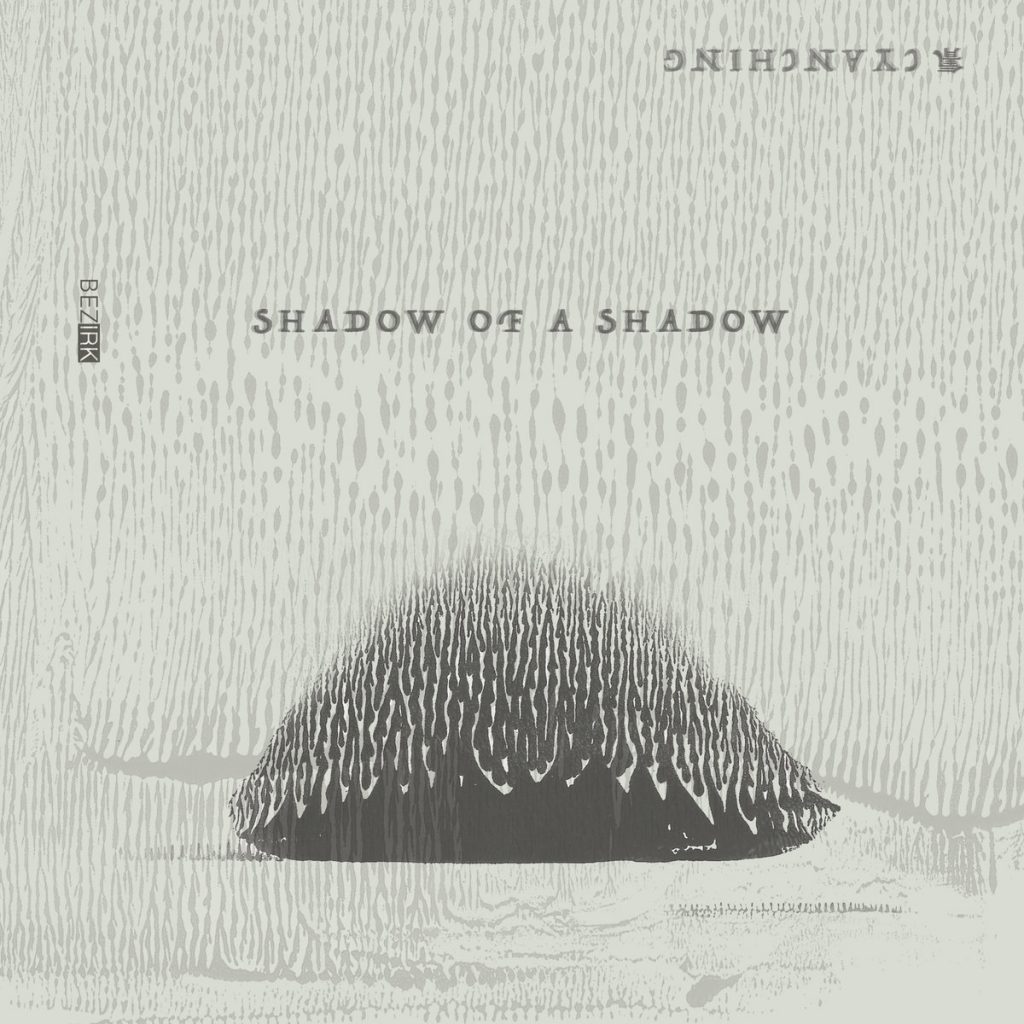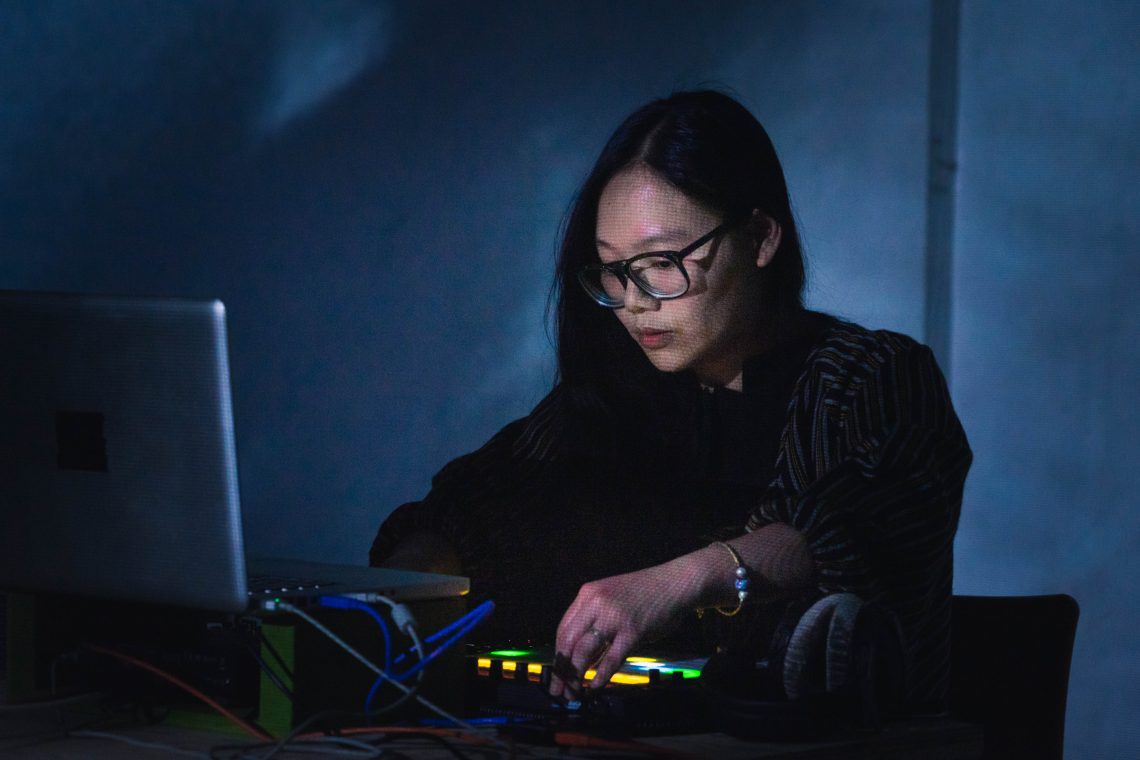
We are with Cyanching in her London apartment listening to her debut album ‘Shadow of a Shadow’ and speaking about the creative process behind this work which was published on cassette on Bezirk and debuted with positive and rewarding reviews.
We begin by listening to the B side of the tape.
David: We are listening to Fermentation as we speak. Where does the name of this piece comes from?
Cyanching: So, the piece meant to be an opener for the bloody history I wanted to tell. That’s why it’s called fermentation. In the beginning I wanted to create a feeling of entering a tunnel, the tunnel of a history.
David: The granular-textures sound really organic, was that intentional? Does the process of fermentation relates in some way to the way in which you composed this piece?
Cyanching: Yes, I feel that granular texture works as a whisper and pretends to illustrate the voice of Taiwanese people who haven’t been heard in the process of establishing a transitional justice. The density of the granular “whispers” shows that Taiwanese people need to be heard.
David: Based on previous conversations we had, the political context of Taiwan is quite important for you as an artist. When it became so important? And also what do you want for the listener to be aware of about the history of Taiwan?
Cyanching: When I was 16 and 17 I felt really conflicted about my national identity, this was when I started to have more information (news, website, article or others) from the international media. As a Taiwanese, we are often asked: are you Chinese? People (From Western) asked this, mostly means your ethnic group. But Chinese this word for me is more a term that means you are from China, the nation not the ethnic group. Chinese this word shouldn’t be used to present a certain ethnic group for the first place, because at the same time another meaning of this word refers to the citizen of People Republic of China. It really confuses people and it’s not politically right. Of course I always said no, I’m Taiwanese. But when I was young back then, I didn’t know what to explain and why the awkwardness came from my mind. and when I was early 20s, I started learning more about the fact of Taiwanese history and felt the history I learned during my compulsory study at school were mostly distorted ones. From this point, I started finding the missing pieces of the puzzle (identity) and felt the need to express this through my own way (making noise, sound, music…). For listeners (mostly for people who don’t know any history of Taiwan), this is an audio journey for them to experience the horror and bloody part of our history. The aim is to feel what those people in the past felt and then raise the listeners curiosity that urges them to look into the written text of the history to find out what actually happened
David: Considering that the album was influenced by strong political views, would you say that the album could present a challenging listen?
Cyanching: People easily forget about the past. There’s common saying (but I feel it’s very irresponsible saying) in Taiwan: Never look back, just keep on going. Lots of Taiwanese feel there’s no point to figure out what KMT (Kuomintang, the party of old Chinese government escaped to Taiwan back then even until now they are still in Taiwan) had done to Taiwanese people, mostly because we are now okay with life and now we are a democratic country no longer living under the dictatorship; lots of Taiwanese are afraid of those hassle made by pursuing the truth because that might affect their now peaceful life and might even affect them financially (some of them born in a privilege family that KMT granted it). But people don’t see the serious harm behind it: if the transitional justice which involves revealing the truth, is not completed, the future generation won’t develop a sound mindset and won’t have solid confidence in mind, in culture, in society or others. We will always live under confusion and conflict and just wander around. I’m not saying all the Taiwanese above. As a part of younger generation of Taiwanese, we are more aware of the truth and we are trying to bring the echo chamber to the level of nation-wide
David: A few minutes ago you told me that Taiwan has been occupied by different cultures. How does it reflect in Taiwan’s culture and political context?
Cyanching: I think mostly we developed open-minded. We are quite open to things that are different from us and willing to embrace them as part of our life, culture and society. In terms of political context, from my observation, I think, in the beginning of each occupation (Netherland, Spain, Japan, old Chinese Government), there were a lot of suppression and especially we had a very long martial law period (around 40 years) and experienced the white terror, people became silent about politics and dare not and avoid talking about politics. Throughout the time, people don’t care about it as long as their life is okay.
David: Seems to me like the notions of repression / oppression played a big role in the conception and production of this album? Tell us about this.
Cyanching: I used a lot of processes to create whispers so the listeners can’t actually know what the whisper is about. Is it just noise? Or is it actually trying to say something? It represents that we were trying to voice ourselves in the past but the authority back then couldn’t bear a single word against them and killed all people with voice or potentially having voice. And now, living in a democratic society, we try to voice ourselves but the misleading information from the opposite side got louder and suppressed us… It’s a work in progress, is the process that people in the past suffered most, and it even left the sequel to the later generations, which let us become silent.
David: Do you think if somebody listens to the album and do not engage in any political aspect, would that mean that the album has not fully succeed?
Cyanching: No. Of course it would be great if people can be curious about the political context after listening to it. I really like the concept of Roland Barthes the death of the author. When people listen to my music, it’s not necessary to have an understanding of the purpose of the album. They can interpret my music in their own way; it can be associated with their own personal life, their awful life experience/memory or even just an imaginary story they make up while listening to the music. The album can be their own personal journey.
David: So the political context in which this album was produced worked like an internal force that took form through music?
Cyanching: So, it is related to how I started those tracks. Political concept is always in my mind. however, when I make music, I don’t have any sound imagination in my mind and i don’t really know what kind of sound can fit the political theme. I mainly experimented around the raw material and came out with sounds that I felt it can be a certain political context. the form took from music and the music (sound) also took from the form.
David: Do the liner notes give a special context to the experience?
Cyanching: The liner note actually doesn’t provide that much information about the background, it only gives a hint that it’s about the political situation in Taiwan and leaves the listeners to experience themselves.
David: So as we spoke before the political context in Taiwan is the main force behind this very powerful album?
Cyanching: Yes, the political context in Taiwan is definitely the main behind this album.
David: You have mentioned that sampling is a very important technique is your compositions. Tell me about your beginnings with sampling, and what are your personal techniques for sampling?
Cyanching: Traditionally, sampling refers to taking from a part of the original track, but I redefined sampling as re-create the element (the sound I like) of the original track as close as possible. By doing so, I might like my version of the sound more instead of the original one.
David: So your technique of sampling is like a recreation?
Cyanching: You can say so.
David: For this album did you recreate / samples from specific genres, styles, schools of composition?
Cyanching: I didn’t do it from specific genres. I tried to sample from eclectic selection of music. This actually reflects to the fact that Taiwan embraces so many different cultures and we are multicultural. And from a political point of view, we got a lot of various voices/opinions in the society. I wanted to emphasise “diversity” so I decided to sample from different kinds of genres.
David: Did you sample any music from Taiwan?
Cyanching: Actually nope! it happened that what I listen to are mostly western music and Taiwan music doesn’t really raise my interest to sample. The interest here is not because Taiwan music is not good enough, mostly Taiwan music is very personal and emotional value to me. The interest is more about the pattern and texture of the sound that Taiwan music mostly lack of.
David: The album sounds like a journey through different emotions, places and textures structured in a very coherent way. What can you tell us about the process of composition? Do you composed it as a whole or you created fragments that later developed into the full record?
Cyanching: The composition is mainly layers of loops of fragments that most of them constantly evolve to different timbres through out the time. The evolution of themselves slowly transit the emotion to the next one, and once the emotion change, new loops of elements were added and layer with some symbolic and distinct elements so there were always the same elements there to interchain different emotions to make it sound a full piece.
David: considering this, would you say that as a composer your work on two aspects, the linear timeline and the depth produced by layering / juxtaposing sounds?
Cyanching: Yes, the linear timeline creates a certain direction, maintain a certain consistency, make the music like a journey. For the depth that I used layering/juxtaposing sounds makes it rich in the ear and creates a sense of excitement that you can’t just listen to it for only one time. you have to listen to it again and again.
David: I have been lucky to have you performing in cooking concerts and have noticed your passion about making food and how important it is for you. Do you see any relation between the process of cooking and making music?
Cyanching: Most of the time, I cook in the kitchen myself, it’s like working in the studio making music myself. Once you know what you are doing, the workflow in the kitchen is like making music with a computer. In the kitchen, you start from one task and extend to multitasking (chopping, boiling the water, wash ingredients and others). You gradually have layers of sounds surrounding you. It’s like making music, start an idea, play around the others, and put them together, take one out and add one in, develop a bit of the previous one and add another new element. They both (ccoking and making music) are very similar process and there’s another thing they are so similar it’s the intuition of taste coming from your background your daily life, what you’ve been exposed to.
David: Something that I find really rewarding is the contrast between the a side and the b side of the release. The a side seems more dynamic and emotionally fluctuating, while the b side seems more attached to a sense of spatiality and abstractness. Do you have anything to say about this?
Cyanching: A side is meant to deliver the different political ideologies (how people feel and think) in Taiwan, that might be why it sounds so emotionally fluctuating. B side is to create the experience of how people felt in the past when they were suffering, it’s a chamber of past memories in the history, people nowadays like me won’t be able to express the feeling most precisely but can only use our imagination and reflection of empathy.
David: This is your first album and the reception has been very positive from editors of different publications, do you believe that the reviews written about the piece have showed you aspects about the album and the process behind it, that were not that visible for you?
Cyanching: When I made this album, I didn’t really think about this album or the tracks should sound like which artists or should be expected to hear with whom those editors or reviews compare me. same as how they described my music, some of them I didn’t actually really notice but just subconsciously applied to my composition.
David: Do you have anything else to say about SHADOW OF A SHADOW that we haven’t covered in this interview?
Cyanching: SHADOW OF A SHADOW refers to both production and concept sides of the album.
for concept, it represents the karma. our past made us, and the cause and effect is like a loop that keeps cycling, like when you look into a mirror in a mirror, your image is endless for production, I feel every artist has their own influences, they might apply those influences to their own work subconsciously. This is why the first side of this album is mostly sampling and looping of short fragments but I aimed to create a piece that people can’t recognise obviously where the samples come from.
David: Finally what can we expect from your second album?
Cyanching: If nothing’s on the way might be just before next September. I’m planning to release an album with my sister about my family factory in the sunset industry. My sister will be doing the cover art and release her own short (or maybe a proper length) comic book about the same theme at the same time.

[bandcamp width=100% height=120 album=1006348597 size=large bgcol=ffffff linkcol=0687f5 tracklist=false artwork=small]

